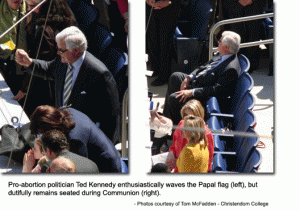There is a phrase obituary writers use to describe the human tendency to “de mortuis nil nisi bonum,” or, speak no ill of the dead. They call it the posthumous parallax, and define it “as a bending of life histories toward all that is light and wholesome, away from anything that might reflect unfavorably on the dead.”
What brings these thoughts to mind, of course, is the passing of the late Sen. Ted Kennedy. For the past half-century, Kennedy and his clan have been lauded as liberal gladiators who fought on behalf of the last and the least. But they’ve also been denigrated as incorrigible rakes whose personal moral failings taint their accomplishments. My guess is that we’ll hear a lot more about the former than the latter in the next week.
Regardless, Ted Kennedy was a Catholic, this much we know. USA Today called him “devout,” and said Kennedy clung to a Christian belief in redemption (Lord knows how many times his own career was resurrected) while publicly disagreeing with church leaders on abortion and gay rights. Notably, Kennedy apparently declined to take Communion when Pope Benedict XVI celebrated Mass in Washington.
Stepping into the Wayback Machine here, Kennedy spoke of his faith in a speech in 1983 at the late Jerry Falwell’s Liberty Baptist College, now called Liberty University.
Almost immediately, Kennedy noted that he was a fish out of water, saying some people “seem to think it’s easier for a camel to pass through the eye of a needle than for a Kennedy to come to the campus of Liberty Baptist College.”
Kennedy continued: “I am an American and a Catholic; I love my country and treasure my faith. But I do not assume that my conception of patriotism or policy is invariably correct, or that my convictions about religion should command any greater respect than any other faith in this pluralistic society. I believe there surely is such a thing as truth, but who among us can claim a monopoly on it?”
“People of conscience should be careful how they deal in the word of their Lord. In our own history, religion has been falsely invoked to sanction prejudice — even slavery — to condemn labor unions and public spending for the poor. I believe that the prophecy, “The poor you have always with you” is an indictment, not a commandment. And I respectfully suggest that God has taken no position on the Department of Education — and that a balanced budget constitutional amendment is a matter of economic analysis, and not heavenly appeals.” (H/t: to the Brody file; see the whole speech here.)
The Rev. Jim Wallis of Sojourners said Wednesday that Kennedy was the first Democrat to call him after the 2004 presidential elections, when liberals were widely seen to have ceded so-called “values voters” to the GOP.
Wallis says: “He invited me to his home, where he, and his wife Vicki, engaged me in a long and very thoughtful conversation, into the night, about the relationship between faith, morality, and politics. Their own deep Catholic faith was evident and their articulation of it very impressive. Our discussion was not partisan at all–it was not about how to win religion back for the Democrats. Rather, we focused on the great moral issues facing the nation, and how we as people of faith needed to respond to them.”
Catholic writer Michael Sean Winters says trying to briefly encapsulate Kennedy’s career is like being “asked to give a synopsis of World War II, or the Pauline Epistles.”
In so much he did, Kennedy “was the champion, year in and year out, of so many causes at the heart of Catholic social teaching,” Winters writes.
He continues: “He voted for the Civil Rights Act and the Voting Rights Act which changed the lives of black Americans for the better. He voted for Medicare and Medicaid which changed the lives of the poor and the elderly for the better. He voted – he actually wrote – Title IX, which changed the lives of female athletes for the better. He voted for SCHIPS which changed the lives of poor children for the better. The world is a better place because of Ted Kennedy’s 47 years in the U.S. Senate.”
Others, however, have not spoken so kindly of Kennedy.
After Kennedy was diagnosed with brain cancer in May, Elizabeth Scalia of Inside Catholic wrote:
“Stories of Ted Kennedy’s non-partisan kindnesses toward his congressional colleagues are well-documented, and anecdotes abound on his willingness to press an acquaintance for the benefit of a child in dire straits. But the quiet altruism of a public man is always overshadowed by the noise of his sins. In Kennedy’s case, those raucous sins — added to a life-narrative littered with images of violent, tragic deaths, reckless behavior, and rough politics — initially made inner voices of compassion difficult to hear.”
To end where we began, here’s what Ted said when he eulogized his brother Robert.
“My brother need not be idealized, or enlarged in death beyond what he was in life, to be remembered simply as a good and decent man, who saw wrong and tried to right it, saw suffering and tried to heal it, saw war and tried to stop it.”
(The photo, posted on Free Republic, is Kennedy waving the papal flag at the 2008 Mass in Washington.)





